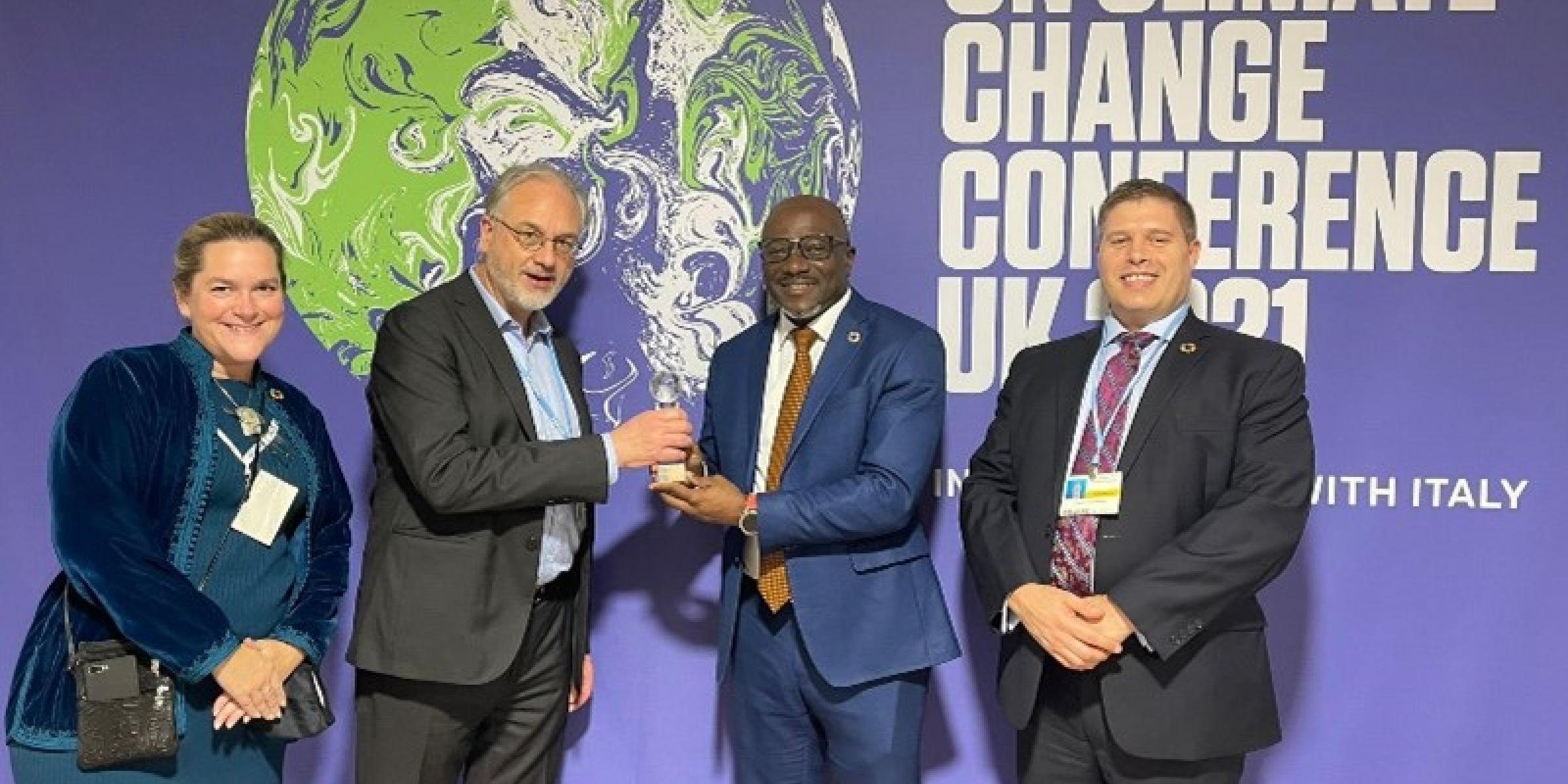Held in conjunction with COP26, Climate Law and Governance Day (CLGD) hosted on November 5, 2021, at the University of Glasgow in collaboration with the University of Cambridge, the University of Strathclyde, and over 200 institutional and intergovernmental partners including the Green Climate Fund, UN Environment, European Bank for Reconstruction and Development, among many others, provided a start to a fast-paced agenda of activities. Convening over 180 speakers in 3 plenary sessions and 16 concurrent expert panels, CLGD attracted more than 450 in-person and 1200 online participants to engage leading research initiatives focused on advancing climate ambition. Throughout the preparation and hosting of the day, I had the privilege to direct a team of over 50 graduate students from the host institutions to execute the day providing operational and technical support for the sessions. Outcomes and conclusions from CLGD were shared in an official COP26 side event on November 6, 2021, in the Blue Zone.
[[{"fid":"5412","view_mode":"wysiwyg","fields":{"class":"media-element file-teaser cke_widget_element","data-delta":"1","format":"wysiwyg","field_file_image_alt_text[und][0][value]":false,"field_file_image_title_text[und][0][value]":false,"external_url":""},"type":"media","field_deltas":{"1":{"class":"media-element file-teaser cke_widget_element","data-delta":"1","format":"wysiwyg","field_file_image_alt_text[und][0][value]":false,"field_file_image_title_text[und][0][value]":false,"external_url":""}},"attributes":{"class":"media-element file-wysiwyg","data-delta":"1"}}]] [[{"fid":"5422","view_mode":"wysiwyg","fields":{"format":"wysiwyg","field_file_image_alt_text[und][0][value]":false,"field_file_image_title_text[und][0][value]":false,"external_url":""},"type":"media","field_deltas":{"2":{"format":"wysiwyg","field_file_image_alt_text[und][0][value]":false,"field_file_image_title_text[und][0][value]":false,"external_url":""}},"attributes":{"class":"media-element file-wysiwyg","data-delta":"2"}}]]
On November 7, 2021, a specialization cause was held at the University of Strathclyde to build global capacity on issues of law and governance related to climate change. Bring together over 70 in-person and 100 online participants, the full-day course instructed by leading international experts and negotiators provided a survey of relevant issues and exercises to increase aptitude among members of national delegations and intergovernmental and non-governmental organizations in attendance. During the specialization course, I directed our onsite team, provided support to our expert instructors and hosts, and facilitated the exercises for online participants.
[[{"fid":"5432","view_mode":"wysiwyg","fields":{"class":"media-element file-teaser cke_widget_element","data-delta":"4","format":"wysiwyg","field_file_image_alt_text[und][0][value]":false,"field_file_image_title_text[und][0][value]":false,"external_url":""},"type":"media","field_deltas":{"4":{"class":"media-element file-teaser cke_widget_element","data-delta":"4","format":"wysiwyg","field_file_image_alt_text[und][0][value]":false,"field_file_image_title_text[und][0][value]":false,"external_url":""}},"attributes":{"class":"media-element file-wysiwyg","data-delta":"4"}}]]
The second week of COP26 was dedicated to following the textual progression relating to Article 6, intersections with the transparency regime and other international instruments and supporting the hosting of a second official side event. While negotiations were underway I was able to participate in the presentation of a Global Leadership Award to Paul Watkinson, Chair (2018-2019), Subsidiary Body for Scientific and Technological Advice (SBSTA), and director for European and international affairs in the French ministry for ecological and solidary transition, with Mr. Tosi Mpanu Mpanu, Ambassadeur. Cabinet du Ministre de l'Environnement et. Développement Durable, Democratic Republic of Congo, and Professor Dr Marie-Claire Cordonier Segger, Leverhulme Trust Visiting Professor, University of Cambridge.
In addition, I had the chance to coordinate the hosting of an official side event in support of one of the institutional partners from the Climate Law and Governance Initiative (CLGI), the University of Waterloo, where among my colleagues from the University of Cambridge I was able to act as an expert intervenor.
[[{"fid":"5462","view_mode":"wysiwyg","fields":{"class":"media-element cke_widget_element file-teaser","data-delta":"6","format":"wysiwyg","field_file_image_alt_text[und][0][value]":false,"field_file_image_title_text[und][0][value]":false,"external_url":""},"type":"media","field_deltas":{"6":{"class":"media-element cke_widget_element file-teaser","data-delta":"6","format":"wysiwyg","field_file_image_alt_text[und][0][value]":false,"field_file_image_title_text[und][0][value]":false,"external_url":""}},"attributes":{"class":"media-element file-wysiwyg","data-delta":"6"}}]]
On Friday and into the late hours of Saturday of the second week the Parties negotiated and eventually agreed on the remaining elements of the Paris Agreement Work Programme. The Glasgow Climate Pact (Decision 1/CP.26) includes commitments to “phase out unabated coal power and inefficient fossil fuel subsidies,” pathways to advance adaptation finance, enhancing capacity building and technology, long-term commitment for the creation of the loss and damage facility, and modalities for implementation encompassing market and non-market mechanisms.
While a greater level of ambition was hoped for, for example seeing the watering down of the commitment to phase out coal in the closing hours was especially unfortunate, COP26 followed through on the commitment to operationalize the Paris Agreement and will prove to be an important step in advancing efforts to abate anthropogenic climate change. It was a pleasure to attend and contribute to this important moment in the evolution of international law related to climate change.

